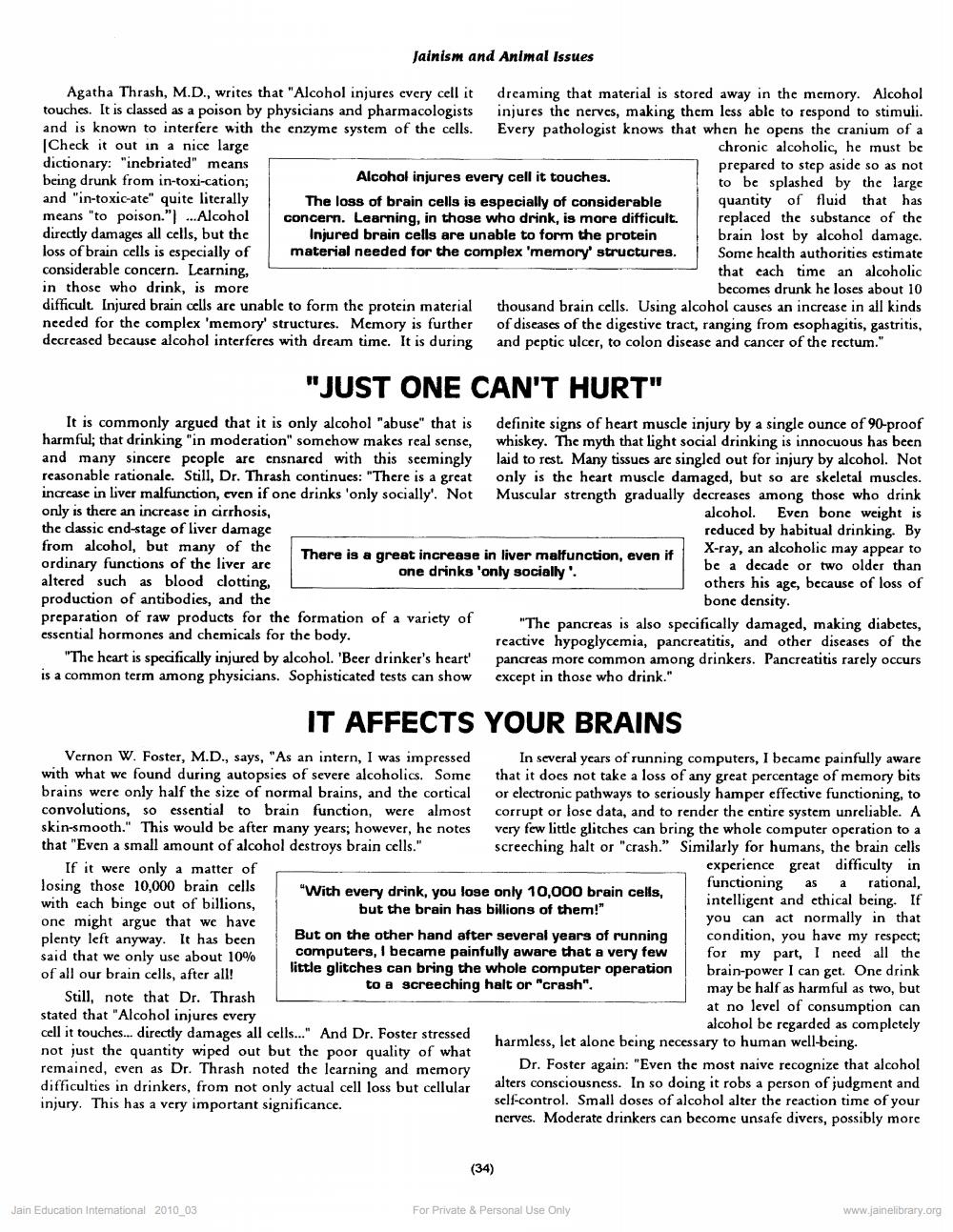________________
Agatha Thrash, M.D., writes that "Alcohol injures every cell it touches. It is classed as a poison by physicians and pharmacologists and is known to interfere with the enzyme system of the cells. [Check it out in a nice large dictionary: "inebriated" means being drunk from in-toxi-cation; and "in-toxic-ate" quite literally means "to poison."] ... Alcohol directly damages all cells, but the loss of brain cells is especially of considerable concern. Learning, in those who drink, is more
difficult. Injured brain cells are unable to form the protein material needed for the complex 'memory' structures. Memory is further decreased because alcohol interferes with dream time. It is during
Jainism and Animal Issues
"JUST ONE
It is commonly argued that it is only alcohol "abuse" that is harmful; that drinking "in moderation" somehow makes real sense, and many sincere people are ensnared with this seemingly reasonable rationale. Still, Dr. Thrash continues: "There is a great increase in liver malfunction, even if one drinks 'only socially'. Not only is there an increase in cirrhosis, the classic end-stage of liver damage from alcohol, but many of the ordinary functions of the liver are altered such as blood clotting, production of antibodies, and the preparation of raw products for the formation of a variety of essential hormones and chemicals for the body.
If it were only a matter of losing those 10,000 brain cells with each binge out of billions, one might argue that we have plenty left anyway. It has been said that we only use about 10% of all our brain cells, after all!
Alcohol injures every cell it touches.
The loss of brain cells is especially of considerable concern. Learning, in those who drink, is more difficult. Injured brain cells are unable to form the protein material needed for the complex 'memory' structures.
CAN'T HURT"
definite signs of heart muscle injury by a single ounce of 90-proof whiskey. The myth that light social drinking is innocuous has been laid to rest. Many tissues are singled out for injury by alcohol. Not only is the heart muscle damaged, but so are skeletal muscles. Muscular strength gradually decreases among those who drink
alcohol. Even bone weight is reduced by habitual drinking. By X-ray, an alcoholic may appear to be a decade or two older than others his age, because of loss of bone density.
"The heart is specifically injured by alcohol. 'Beer drinker's heart' is a common term among physicians. Sophisticated tests can show
Jain Education International 2010_03
There is a great increase in liver malfunction, even if one drinks 'only socially'.
Vernon W. Foster, M.D., says, "As an intern, I was impressed with what we found during autopsies of severe alcoholics. Some brains were only half the size of normal brains, and the cortical convolutions, so essential to brain function, were almost skin-smooth." This would be after many years; however, he notes that "Even a small amount of alcohol destroys brain cells."
dreaming that material is stored away in the memory. Alcohol injures the nerves, making them less able to respond to stimuli. Every pathologist knows that when he opens the cranium of a chronic alcoholic, he must be prepared to step aside so as not to be splashed by the large quantity of fluid that has replaced the substance of the brain lost by alcohol damage. Some health authorities estimate that each time an alcoholic becomes drunk he loses about 10 thousand brain cells. Using alcohol causes an increase in all kinds of diseases of the digestive tract, ranging from esophagitis, gastritis, and peptic ulcer, to colon disease and cancer of the rectum."
IT AFFECTS YOUR BRAINS
Still, note that Dr. Thrash stated that "Alcohol injures every cell it touches... directly damages all cells..." And Dr. Foster stressed not just the quantity wiped out but the poor quality of what remained, even as Dr. Thrash noted the learning and memory difficulties in drinkers, from not only actual cell loss but cellular injury. This has a very important significance.
"The pancreas is also specifically damaged, making diabetes, reactive hypoglycemia, pancreatitis, and other diseases of the pancreas more common among drinkers. Pancreatitis rarely occurs except in those who drink."
In several years of running computers, I became painfully aware that it does not take a loss of any great percentage of memory bits or electronic pathways to seriously hamper effective functioning, to corrupt or lose data, and to render the entire system unreliable. A very few little glitches can bring the whole computer operation to a screeching halt or "crash." Similarly for humans, the brain cells
"With every drink, you lose only 10,000 brain cells, but the brain has billions of them!"
But on the other hand after several years of running computers, I became painfully aware that a very few little glitches can bring the whole computer operation to a screeching halt or "crash".
(34)
experience great difficulty in functioning as a rational, intelligent and ethical being. If you can act normally in that condition, you have my respect; for my part, I need all the brain-power I can get. One drink may be half as harmful as two, but at no level of consumption can alcohol be regarded as completely
harmless, let alone being necessary to human well-being.
Dr. Foster again: "Even the most naive recognize that alcohol alters consciousness. In so doing it robs a person of judgment and self-control. Small doses of alcohol alter the reaction time of your nerves. Moderate drinkers can become unsafe divers, possibly more
For Private & Personal Use Only
www.jainelibrary.org




